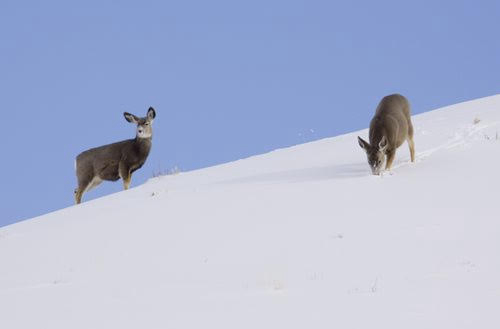SCI Foundation Contributes $537,590 To Worldwide Wildlife Conservation Projects
Washington, DC – Safari Club International Foundation (SCI Foundation) announced today that it has contributed $537,590 in the past six months to fund worldwide wildlife conservation projects. SCI Foundation strategically focuses funding towards research and management of large predators and their prey, including game species, principally throughout North America, Asia, and Southern Africa.
“The research programs selected by SCI Foundation’s professional biologists inform wildlife managers and policy makers on critical wildlife management needs worldwide,” said SCI Foundation President Joe Hosmer. “SCI Foundation strives to ensure management decisions are based on the best available science.”
North American Projects
SCI Foundation donated $350,000 to fund multiple predator/prey projects in the U.S. and Canada. Conservation projects include Predator/Prey studies observing rates of white-tailed deer fawn survival in Michigan and Wisconsin, elk survival in Montana, and caribou survival in Newfoundland. The results of these projects will help properly manage both predators and prey in systems where both exist. Donations were also made to wildlife population research and enhancement programs including mule deer in the Eastern Mojave Desert, brown bears on Kodiak Island, black bears in Missouri, and moose in Alaska, among others.
The most recent project is a partnership with Alaska Department of Fish and Game’s Kenai Moose Project. SCI Foundation donated $20,000 to learn productivity and seasonal mortality of moose.
African Projects
In multiple African nations, SCI Foundation has given over $123,000 to wildlife conservation and human-wildlife conflict programs. Most recently, SCI Foundation donated $30,000 for the upcoming African Wildlife Consultative Forum, which will be held in Botswana.
SCI Foundation also continues to fund lion research in Zambia to improve the accuracy of aging lions in their natural environment. Being able to accurately age lions in the field will assist range states develop appropriate lion harvest regulations to ensure sustainability.
“Throughout the year, SCI Foundation contributes over one million dollars to wildlife research, management, and anti-poaching programs. As an international organization, SCI Foundation continues to increase our financial impact for sustainable-use conservation and we hope more organizations can follow our lead,” concluded Hosmer.
Below is a partial list of contributions to wildlife species made over the last 6 months:
Lion (Southern Africa) $30,000
Elephant (Zimbabwe) $25,200
Leopard (Zimbabwe, Namibia) $18,000
Wildlife Genetics (Africa) $20,000
Brown Bear (Alaska) $50,000
Black Bear (Missouri) $25,000
Elk (Montana. & Ontario) $69,800
White-tailed deer (Mich. & Wisc.) $75,000
Mule Deer (Calif. & Colorado) $40,880
Moose (Alaska) $33,500
Caribou (Newfoundland) $8,550
Bighorn Sheep (Mont. & Wyo.) $31,500
Dall Sheep (Alaska) $5,000
Predator ID Manual (Intl) $10,000
Conservation Matching Grants $8,000
African Wildlife Forum $30,000
The SCI Foundation is a 501(c)(3) nonprofit charitable organization that funds and manages worldwide programs dedicated to wildlife conservation, outdoor education and humanitarian services, including such programs as Sportsmen Against Hunger, Sensory Safari, Safari Care, Disabled Hunter, the American Wilderness Leadership School, Becoming an Outdoors Woman & More and Youth Education Seminars (YES) Outdoors. Call 877-877-3265 or visit www.sci-foundation.org for more information.
Becoming an SCI Member:
Joining Safari Club International is the best way to be an advocate for continuing our hunting heritage and supporting worldwide sustainable use conservation, wildlife education and humanitarian services. JOIN NOW: www.safariclub.org/Join.






